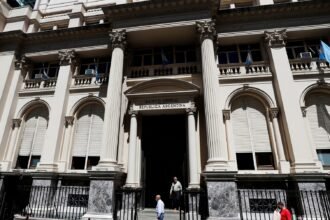ADDIS ABABA, April 11 (Reuters) – Ethiopia may have to decide on a big currency devaluation sooner rather than later to secure a rescue loan from the International Monetary Fund (IMF), which left the country last week without reaching a much-needed deal with authorities.
Ethiopia hasn’t received any IMF funds since 2020 and its last lending arrangement with the fund went off track in 2021. The federal government and a rebellious regional authority signed a deal in late 2022 to end a two-year civil war.
Chronic foreign currency shortages and a tightly controlled exchange rate has allowed a black market to flourish, on which the birr currently trades at between 117 and 120 per dollar, more than double the official rate of around 56.7 .
“It seems that the Ethiopian authorities have found accepting the demands of the IMF hard,” said Abdulmenan Mohammed, an Ethiopian economic analyst based in Britain.
“The Ethiopian authorities are worried about devaluation of the birr, (which) would have serious negative economic repercussions, including soaring inflation… and surging foreign currency denominated debts in terms of birr.”
‘PLAYING HARDBALL’
In early 2021, Ethiopia requested a debt restructuring under the G20’s Common Framework, a process established in response to the COVID-19 pandemic to bring in newer creditor countries like China and India. But progress was initially delayed by the civil war.
The country’s external debt was $28.2 billion at the end of March, based on government data.
In August 2023, it secured a debt payments suspension from its largest bilateral creditor China, which from 2006 to 2022 committed to lending the country $14 billion, according to Boston University’s Chinese Loans to Africa Database.
There are widely varying estimates of the size of currency devaluation the IMF would accept, that could pave the way for a deal.
“We retain the view that the IMF will require a good faith measure that solidifies Ethiopia’s intent to implement a more flexible FX (foreign exchange) regime,” she said in a note to clients. “(This) will set the scene for a series of stepwise devaluations on the path to FX liberalisation and monetary policy reform.”
“Ethiopia is coming into the meeting room with the IMF that is playing hardball and saying, ‘You don’t really have a foot to stand on, in terms of negotiating down our position,'” he said.
Nonetheless, Vasey said he expected Ethiopia to secure an IMF deal soon.
“There’s an international push to get this all lined up. It’s just a question of sequencing of the reforms,” he said.
“The team made substantial progress,” she said. “These discussions are continuing and will continue at the upcoming Spring Meetings.”
“The exchange rate unification remains one important policy goal,” he said at that time. “But we are just doing it gradually.”
Sign up here.
Reporting by Rachel Savage in Johannesburg and Dawit Endeshaw in Addis Ababa; Additional reporting by Duncan Miriri in Nairobi, Editing by Karin Strohecker and Jane Merriman
Our Standards: The Thomson Reuters Trust Principles.




















